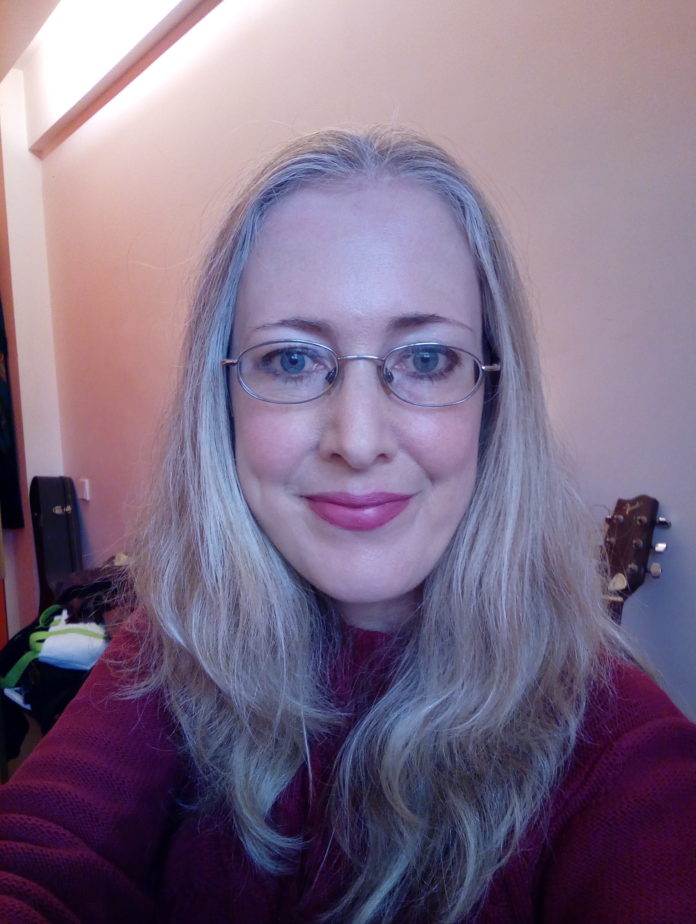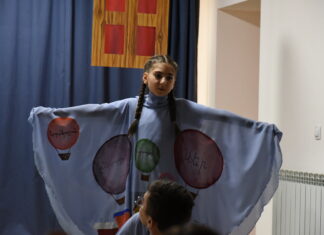YEREVAN/CAMBRIDGE — Katherine Hodgson is a British linguist whose main subject of research is Armenian and its dialects. She spent four years living in Armenia, conducting linguistic research and teaching at the Vazgenyan Theological Seminary by Lake Sevan. She left Armenia to complete the final year of her PhD in Paris, where she was welcomed by the large Armenian community and regularly took part in Armenian cultural activities.
There is an expression among expats in Armenia – ABC — Armenian by choice. Can we call you like that taking into account not only your mastering the Armenian but also the fact you have baptized in an Armenian church?
Yes, I’m happy with that.
Lord Byron studied the Armenian language in order to make his brain busy with a difficult and charming task. What was the motivation after some 200 years Byron’s compatriot studied the same language?
The original motivation was because of my work in linguistics, specifically on modern Greek dialects spoken in Armenia, I was interested in studying the contacts between Greek and Armenian, as these two peoples have been in contact for thousands of years, but while engaged in this ‘difficult and charming task’ I met some really wonderful and interesting people who helped me on the way, and it became a real pleasure in itself.
It is interesting to note that among the researchers of Armenian dialects there are non-Armenians, like Polish Andrzej Pisowicz and American Bert Vaux. To examine a language’s dialects means first to master a high knowledge of the literary language.
Not necessarily in that order, but knowing one certainly helps to learn and understand the other.
Please tell our readers about your academic activities – what path have you crossed and where are you now?
I have just finished my PhD at Inalco in Paris, under the supervision of the French-Armenian linguist and head of the Armenian Studies department Anaid Donabedian. Because of this I spent the last year in Paris, to finish and defend my thesis. I have just been accepted for a two-year post-doctoral fellowship at the University of Cambridge, funded by the Endangered Languages Documentation Project, which will involve working with the few remaining speakers of the dialect of Agulis (‘zokeren’) and the surrounding villages who left Nakhijevan for Armenia in 1988. I hope to be back in Armenia after the New Year to work on this project. The results will be made publicly available online for anyone to look at and make use of.
You lived in Yerevan for four years – how can you characterize the life here?
I found it a very pleasant place to live, very relaxed and friendly. I never once had the feeling of being alone in a foreign country. I was particularly struck by the level of trust and humanity in interactions with strangers (people in Armenia couldn’t believe that children in England are taught not to talk to strangers, and people in England couldn’t believe that in Armenia, people let strangers hold their bags and even their children on public transport). I also found the sense of humor strangely familiar, which was a big part of why I felt at home; an Armenian bishop I worked with who spent several years studying in England made the same observation.
How was your teaching experience at the Vazgenian Seminary in Sevan?
I really felt like part of a big family there. I think I learnt at least as much from my students as they did from me, I am still in touch with a lot of them, it was the start of what I am sure will be lifelong friendships. And it is a very special place, that has some sort of indescribable spiritual power. I still miss it.
Are you familiar with Armenian literature? Do you have a favorite author?
I particularly liked Hin Astvacner (Ancient Gods) by Levon Shant, I read it before I ever imagined I would end up working at Sevan, at first I didn’t realize it was the same place!
What can a non-Armenian do in this society, eager for a better life and full of expectations for positive changes?
I think the most important thing is to help young people to believe that there are opportunities for the future in Armenia, and that there are some positive things in Armenia that could make a person choose to leave another country and live there. From this point of view, just living in Armenia in itself can have a small positive impact. But of course the most important thing would be to actually create opportunities. Working with young people in Armenia, I was most impressed by their outward-looking attitude and readiness to embrace and create innovative ideas, while remaining very much connected to their cultural roots. Foreigners and diaspora Armenians living in Armenia can provide links to the wider world that could help these people to realize their dreams. If a way can be found to allow them to make and exploit international connections while remaining in Armenia, and use the results of their efforts to benefit Armenia, then the future of this country will be bright indeed. But if they can’t support themselves, let alone a family, with their work, then of course they will try to move to a country where they can, and no-one can blame them for that.
Do you intend to continue your research in the Armenian language?
Sure. As I told you I plan to return to Armenia in the near future with a project documenting the Agulis dialect. I hope that my work will help to spread appreciation among both Armenians and non-Armenians for the beautiful and fascinating Armenian language and its historical and cultural heritage.
Armenia & KarabakhArts & CultureArmenian Languagelinguistics
Katherine Hodgson: Researching the Beautiful and Fascinating Armenian Language
Top 5 Articles
- Trending
- Most Viewed
- Most Commented
- Holy Trinity Armenian Apostolic Church ‘Honoring Our Nonagenarian Members’
- Houshamadyan: Cuisine and Fried Omelets from Diyarbekir
- Haik Kazazyan Wins 2025 Classic Violin Olympus International Competition
- UC Berkeley Human Rights Center Cancels Film Screening on Genocide Remembrance Day
- China Gains Momentum, Just Not in Armenia
- Why I Am Grateful to Erdogan, the Dictator of Turkey
- A Political Whirlwind Engulfs Nagorno Karabakh
- Libya’s Interim Government Recognizes the Armenian Genocide Once Again
- Robert Bedrosian Marries High Tech With Ancient Armenian Manuscripts
- Aleppo Aid through St. Kevork Armenian Apostolic Church of Houston








